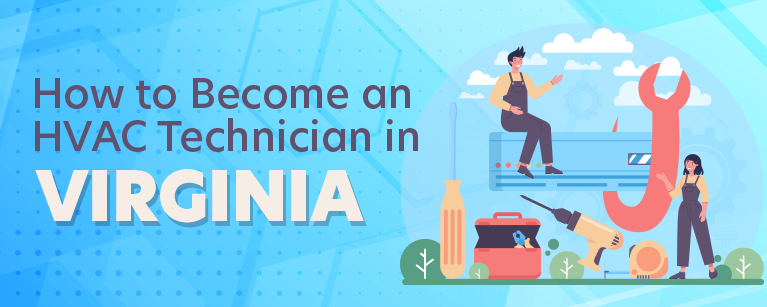
The process of earning the proper certifications and approvals to work in the HVAC tech field legally can seem daunting at first.
My goal is to help ambitious HVAC techs understand clearly what they need to do to become a licensed professional in Virginia.
Yes, it’s a long road but well worth traveling for the career and business opportunities available afterward.
If I can help make someone else’s journey through the licensing labyrinth less confusing, I’ll feel I’ve done my part.
In this blog, I hope to break down exactly what it takes in a way that makes it less intimidating.
I’ll outline things step-by-step from getting entry-level training and experience to taking your licensing exams at each level.
Table of Contents
How to Become an HVAC Technician in Virginia, Step by Step
Here is a step-by-step guide to becoming an HVAC technician in Virginia:
- Earn an HVAC Diploma or Associate’s Degree
Many entry-level positions will require a diploma from a vocational/technical school or an associate’s degree from a community college. Programs take 1-2 years. - Look for an Apprenticeship or Helper Position
Hands-on training is crucial. Many new technicians start as apprentices or helpers to learn skills from experienced professionals. - Gain 2-5 Years of On-the-Job Experience
Virginia allows substituting experience for educational requirements for a Journeyman license. Aim to complete at least 4 years of fieldwork. - Study for the Journeyman License Exam
Review manuals focused on equipment, tools, safety, HVAC design, and more. - Obtain Journeyman HVAC License
With a passing score, you can work independently on residential/smaller commercial systems. The license must be renewed every 2 years.
Education Requirements
Here are the typical education requirements to become an HVAC technician in Virginia:
- High School Diploma or GED – Most employers require a high school diploma or equivalent as the minimum education level.
- HVAC Diploma or Certificate Program – Many 1-year certificate programs are available at community colleges or technical schools.
- Associate’s Degree in HVAC Technology – Two-year Associate’s degrees are increasingly preferred. They fulfill the requirements to become a licensed journeyman.
- Apprenticeship – Typically 5-year programs where you earn while learning directly from trade professionals. Combination of on-the-job training and required classroom hours. Completing an apprenticeship satisfies education for licensing.
- Continuing Education – As a journeyman or contractor, periodic continuing education is required to maintain licenses.
Apprenticeship Programs In Virginia
Apprenticeships are a great way to gain hands-on skills and work experience while earning a wage.
This helps meet licensing requirements for hours worked.
Here are some of the major organizations that offer HVAC apprenticeship programs in Virginia:
Apprenticeships are a time-tested path for launching a lucrative career in the HVAC trade.
HVAC Schools In Virginia
Northern Virginia Community College
- Location: Woodbridge, VA
- Time to Complete: AAS (24 months); certificates (12 months)
- Tuition costs: Virginia resident ($185.50 per credit); out-of-state ($388.25 per credit)
Virginia Beach Technical & Career Education Center
- Location: Virginia Beach, VA
- Time to Complete: 24 months
- Tuition costs: Contact the school for a customized assessment.
Valley Career & Technical Center
- Location: Fishersville, VA
- Time to Complete: 24 months
- Tuition costs: Contact the school for a customized assessment
New Horizons Regional Education Centers
- Location: Newport News, VA
- Time to Complete: 12 months
- Tuition costs: Contact the school for a customized assessment.
Southside Virginia Community College
- Location: Alberta, VA
- Time to Complete: 16 to 32 weeks
- Tuition costs: Level 1 with core (in-state: $847; out-of-state: $2,541); levels 2, 3, or 4 (in-state: $676 each; out-of-state: $2,301 each)
Advanced Technology Institute
- Location: Virginia Beach, VA
- Time to Complete: AOS degree (18 months); diploma (15 months)
- Tuition costs: AOS degree ($36,420); diploma ($29,136)
FORTIS
- Location: Norfolk and Richmond, VA
- Time to Complete: Contact FORTIS for a customized assessment
- Tuition costs: $19,452 total.
HVAC Technician Licenses and Certifications
At the basic entry-level, no license is needed; this is where apprentices and helpers start to gain on-the-job experience.
Journeyman is the first full license that allows independent work on small HVAC systems.
EPA Certificate
Technicians working with HVAC systems must pass one of the EPA 608-approved refrigerant certification exams to legally handle refrigerants.
The core exams cover principles like environmental regulations, refrigerant properties, and proper recovery and recycling procedures:
- Type I certification targets small residential appliances, focusing on recovery techniques and safety issues.
- Type II covers very high-pressure commercial equipment, teaching leak detection and repair methods, and system component identification.
- Type III addresses servicing and disposal of low-pressure systems like chillers. Candidates learn recovery procedures and charging sequences to prevent freezing.
- The universal Type IV certification allows technicians to work on all equipment types.
Passing one of these EPA 608-approved exams is mandatory for any heating or cooling professional handling refrigerants.
Not only does certification demonstrate a technician’s qualifications, but the hefty fines for venting refrigerants legally require this credential.
I recommend all serious HVAC technicians get their EPA certification for their careers and avoid penalties.
| School Name | Address |
|---|---|
| Northern Virginia Community College | 8333 Little River Turnpike, Annandale, VA 22003, United States |
| Virginia Beach Technical & Career Education Center | 2925 N Landing Rd, Virginia Beach, VA 23456, United States |
| Valley Career & Technical Center | 49 Hornet Rd, Fishersville, VA 22939, United States |
| New Horizons Regional Education Centers | 520 Butler Farm Rd, Hampton, VA 23666, United States |
| Southside Virginia Community College | |
| Advanced Technology Institute | |
| FORTIS |
HVAC Technician Salary in Virginia
HVAC technician salaries can vary quite a bit depending on factors like licensing level, experience, location, and employer.
For HVAC technicians, annual pay typically starts at $50,000.
Annual Salary Range:| Location | Avg. Annual Salary |
|---|---|
| Virginia Beach | $46,873 |
| Norfolk | $46,167 |
| Chesapeake | $46,108 |
| Arlington | $54,581 |
| Richmond | $48,432 |
| Newport | $46,422 |
| Alexandria | $54,581 |
| Hampton | $46,422 |
| Roanoke | $45,329 |
| Portsmouth | $46,167 |
Regional Salary in Virginia
| Region | Employed | Avg. Annual Salary | Avg. Hourly Pay | Top 10% Annual Salary | Bottom 10% Annual Salary |
|---|---|---|---|---|---|
| Blacksburg-Christiansburg-Radford, VA | 140 | $44,970 | $21.62 | $62,180 | $25,180 |
| Charlottesville, VA | 360 | $53,440 | $25.69 | $72,910 | $37,540 |
| Harrisonburg, VA | 280 | $52,560 | $25.27 | $73,840 | $36,920 |
| Lynchburg, VA | 420 | $54,230 | $26.07 | $77,350 | $36,290 |
| Richmond, VA | 2,340 | $53,140 | $25.55 | $73,510 | $36,680 |
| Roanoke, VA | 530 | $49,820 | $23.95 | $71,850 | $34,450 |
| Staunton-Waynesboro, VA | 180 | $53,220 | $25.59 | $64,310 | $35,330 |
| Virginia Beach-Norfolk-Newport News, VA-NC | 2,790 | $52,180 | $25.09 | $71,480 | $36,380 |
| Winchester, VA-WV | 140 | $51,180 | $24.61 | $73,600 | $33,370 |
* Employment conditions in your area may vary.
Frequently Asked Questions
If I get my HVAC licenses in another state, can I transfer them to VA?
Virginia does not have a formal process for transferring existing HVAC licenses from other states.
You would generally need to meet Virginia’s license requirements through education, exams, and experience, regardless of prior licenses held elsewhere.
It’s best to contact the DPOR to discuss options.
Can I test for multiple HVAC license levels at once in Virginia?
No, Virginia requires candidates to test separately for each license classification; journeyman, master, and contractor exams cannot be taken simultaneously.
You must obtain one license before becoming eligible for the next level.
Testing individually allows the state to verify qualifications and skills at each step of the licensure process.
I have a misdemeanor charge on my record from 10 years ago. Will I be able to obtain an HVAC license in Virginia?
Having a past misdemeanor may pose additional hurdles, but it does not automatically disqualify you from HVAC licensing in Virginia.
The DPOR conducts a background check as part of the application process.
Minor non-violent offenses from over 7 years ago are typically not grounds for denial on their own.
However, you may have to provide additional documentation explaining the circumstances.
Certain misdemeanors, like theft, could require a hearing.
It’s best to disclose fully and consult with DPOR early in the licensing process so you can take any proactive steps needed, like character references.
With time passing and no further issues, many technicians in your situation do succeed in becoming licensed.
HVAC Technician Info by State
- Alabama
- Alaska
- Arizona
- Arkansas
- California
- Colorado
- Connecticut
- Delaware
- Florida
- Georgia
- Hawaii
- Idaho
- Illinois
- Indiana
- Iowa
- Kansas
- Kentucky
- Louisiana
- Maine
- Maryland
- Massachusetts
- Michigan
- Minnesota
- Mississippi
- Missouri
- Montana
- Nebraska
- Nevada
- New Hampshire
- New Jersey
- New Mexico
- New York
- North Carolina
- North Dakota
- Ohio
- Oklahoma
- Oregon
- Pennsylvania
- Rhode Island
- South Carolina
- South Dakota
- Tennessee
- Texas
- Utah
- Vermont
- Virginia
- Washington
- West Virginia
- Wisconsin
- Wyoming










This HVAC guide for Virginia on Becomeopedia is a gem! It succinctly covers the essentials for anyone looking to navigate the HVAC licensing process in Virginia. The step-by-step breakdown of the requirements, tips, and additional resources is incredibly valuable, providing a comprehensive overview that is easy to understand.